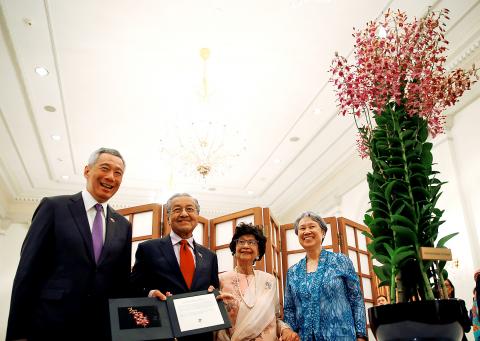Singaporean Prime Minister Lee Hsien Loong (李顯龍) yesterday called for greater integration between Southeast Asian nations at a time when multilateralism is under threat.
His remarks came at a business summit on the sidelines of meetings this week between the 10-member ASEAN and external partners, including the US and China, which are in a dispute over trade.
“ASEAN has great potential, but fully realizing it depends on whether we choose to become more integrated and work resolutely towards this goal in a world where multilateralism is fraying under political pressures,” Lee said at the ASEAN Business and Investment Summit.

Photo: Reuters
Lee has previously said that the US-China trade dispute could have a “big, negative impact” on Singapore, and the city-state’s central bank has said it could soon drag on growth.
Meanwhile, US Vice President Mike Pence said that US President Donald Trump’s absence at the summits was not a snub.
Pence arrived in Tokyo yesterday, with his trip to take him to Singapore and Papua New Guinea.
He faces the challenge of reassuring allies about US policy toward Asia.
The US’ commitment to the Indo-Pacific region “has never been stronger,” Pence told reporters in Alaska on Sunday night en route to Tokyo.
Trump’s decision to skip the event is “not in the least” a snub, Pence said, adding that the president is “where the American people would want him” in Paris for World War I commemorations.
Trump became the first US president not to attend an ASEAN summit since 2013, when then-US president Barack Obama canceled his visit to deal with a US government shutdown.
Pence has the president’s full backing and plans to announce several new initiatives during his week-long trip, a senior US administration official said.
They include bilateral, trilateral and possibly larger initiatives that cover the digital economy, energy and infrastructure, said the official, who briefed reporters on condition of anonymity.
As the top representative from the world’s largest economy, Pence is to have an audience with several world leaders interested in hearing more about US policy.

Conflict with Taiwan could leave China with “massive economic disruption, catastrophic military losses, significant social unrest, and devastating sanctions,” a US think tank said in a report released on Monday. The German Marshall Fund released a report titled If China Attacks Taiwan: The Consequences for China of “Minor Conflict” and “Major War” Scenarios. The report details the “massive” economic, military, social and international costs to China in the event of a minor conflict or major war with Taiwan, estimating that the Chinese People’s Liberation Army (PLA) could sustain losses of more than half of its active-duty ground forces, including 100,000 troops. Understanding Chinese

The Ministry of Foreign Affairs (MOFA) yesterday said it is closely monitoring developments in Venezuela, and would continue to cooperate with democratic allies and work together for regional and global security, stability, and prosperity. The remarks came after the US on Saturday launched a series of airstrikes in Venezuela and kidnapped Venezuelan President Nicolas Maduro, who was later flown to New York along with his wife. The pair face US charges related to drug trafficking and alleged cooperation with gangs designated as terrorist organizations. Maduro has denied the allegations. The ministry said that it is closely monitoring the political and economic situation

UNRELENTING: China attempted cyberattacks on Taiwan’s critical infrastructure 2.63 million times per day last year, up from 1.23 million in 2023, the NSB said China’s cyberarmy has long engaged in cyberattacks against Taiwan’s critical infrastructure, employing diverse and evolving tactics, the National Security Bureau (NSB) said yesterday, adding that cyberattacks on critical energy infrastructure last year increased 10-fold compared with the previous year. The NSB yesterday released a report titled Analysis on China’s Cyber Threats to Taiwan’s Critical Infrastructure in 2025, outlining the number of cyberattacks, major tactics and hacker groups. Taiwan’s national intelligence community identified a large number of cybersecurity incidents last year, the bureau said in a statement. China’s cyberarmy last year launched an average of 2.63 million intrusion attempts per day targeting Taiwan’s critical

AGING: As of last month, people aged 65 or older accounted for 20.06 percent of the total population and the number of couples who got married fell by 18,685 from 2024 Taiwan has surpassed South Korea as the country least willing to have children, with an annual crude birthrate of 4.62 per 1,000 people, Ministry of the Interior data showed yesterday. The nation was previously ranked the second-lowest country in terms of total fertility rate, or the average number of children a woman has in her lifetime. However, South Korea’s fertility rate began to recover from 2023, with total fertility rate rising from 0.72 and estimated to reach 0.82 to 0.85 by last year, and the crude birthrate projected at 6.7 per 1,000 people. Japan’s crude birthrate was projected to fall below six,